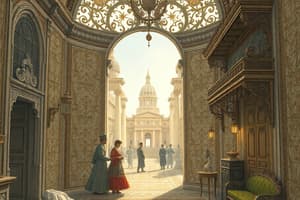Podcast
Questions and Answers
How does Edward Hallet Carr define history?
How does Edward Hallet Carr define history?
- A constructed discourse shaped by interpretations. (correct)
- A scientific study of archaeological artifacts.
- A straightforward account of past events.
- A collection of oral traditions from various cultures.
What is a historical fact primarily concerned with?
What is a historical fact primarily concerned with?
- The interpretation of cultural norms.
- Understanding why events occurred. (correct)
- Recording personal anecdotes from history.
- The chronological order of events. (correct)
What is one reason for frequent disagreements in historical accounts?
What is one reason for frequent disagreements in historical accounts?
- An agreement on the importance of oral history.
- Historians' bias and subjective interpretations. (correct)
- The clear understanding of historical contexts.
- The abundance of written records available.
Which of the following is identified as a challenge in the field of history?
Which of the following is identified as a challenge in the field of history?
What limitation does history face regarding lost context?
What limitation does history face regarding lost context?
What aspect can introduce bias into historical accounts?
What aspect can introduce bias into historical accounts?
Which of the following challenges relates to cultural differences in history?
Which of the following challenges relates to cultural differences in history?
What is a primary obstacle created by incomplete records in history?
What is a primary obstacle created by incomplete records in history?
What aspect of history did Jacob Burckhardt prioritize in his studies?
What aspect of history did Jacob Burckhardt prioritize in his studies?
Which of the following best describes Jacob Burckhardt's view of the Renaissance?
Which of the following best describes Jacob Burckhardt's view of the Renaissance?
What was a significant aspect of Burckhardt's academic background before he became a historian?
What was a significant aspect of Burckhardt's academic background before he became a historian?
How did Burckhardt's perspectives influence his teaching?
How did Burckhardt's perspectives influence his teaching?
What did Burckhardt believe could be understood through art?
What did Burckhardt believe could be understood through art?
What was Burckhardt's stance towards German nationalism?
What was Burckhardt's stance towards German nationalism?
Which institution did Burckhardt NOT teach at?
Which institution did Burckhardt NOT teach at?
In what way did Burckhardt's teaching methodology differ from traditional historians?
In what way did Burckhardt's teaching methodology differ from traditional historians?
What is the main focus of Collingwood's views on history?
What is the main focus of Collingwood's views on history?
What did Collingwood argue about the relationship between history and natural science?
What did Collingwood argue about the relationship between history and natural science?
Which of the following concepts is associated with Collingwood?
Which of the following concepts is associated with Collingwood?
What does Collingwood's idea of historical imagination emphasize?
What does Collingwood's idea of historical imagination emphasize?
What significant works did Collingwood publish related to meta-philosophy?
What significant works did Collingwood publish related to meta-philosophy?
Which philosophical views does Collingwood's idealism largely diverge from?
Which philosophical views does Collingwood's idealism largely diverge from?
What aspect does history need to consider according to the content?
What aspect does history need to consider according to the content?
How did Collingwood and Benedetto Croce view the state of history in relation to natural science?
How did Collingwood and Benedetto Croce view the state of history in relation to natural science?
Which of the following statements reflects Collingwood's view on the methods used in history?
Which of the following statements reflects Collingwood's view on the methods used in history?
Which of the following statements reflects Collingwood's perspective on studying history?
Which of the following statements reflects Collingwood's perspective on studying history?
What theme does Aldous Huxley address in his works?
What theme does Aldous Huxley address in his works?
Which book is NOT authored by Aldous Huxley?
Which book is NOT authored by Aldous Huxley?
In Huxley's view, what is a significant aspect of self-awareness?
In Huxley's view, what is a significant aspect of self-awareness?
What does Huxley critique in modern society through 'Brave New World'?
What does Huxley critique in modern society through 'Brave New World'?
What is one of Huxley's interests mentioned in the content?
What is one of Huxley's interests mentioned in the content?
How does Huxley view technological and political development?
How does Huxley view technological and political development?
What was one of Geoffrey Barraclough's significant contributions to historical methodology?
What was one of Geoffrey Barraclough's significant contributions to historical methodology?
Which of the following roles did Geoffrey Barraclough hold?
Which of the following roles did Geoffrey Barraclough hold?
What does Barraclough's quote suggest about the nature of history?
What does Barraclough's quote suggest about the nature of history?
Arnold J. Toynbee worked for which governmental department?
Arnold J. Toynbee worked for which governmental department?
Where did Arnold J. Toynbee study during his education?
Where did Arnold J. Toynbee study during his education?
What theme is emphasized in Barraclough's view of history?
What theme is emphasized in Barraclough's view of history?
Which historical area was Barraclough particularly known for studying?
Which historical area was Barraclough particularly known for studying?
In which field did Arnold J. Toynbee serve as a professor?
In which field did Arnold J. Toynbee serve as a professor?
Flashcards are hidden until you start studying
Study Notes
What is History?
- Edward Hallet Carr posited that history is a constructed narrative shaped by historians' interpretations, not merely a reflection of past events.
- History involves selecting and interpreting evidence, making it a subjective endeavor rather than the simple discovery of facts.
Understanding Historical Facts
- Historical facts answer "What happened?" and attempt to uncover the reasons behind events and their consequences.
- Historical accounts often lead to disagreements due to lost information, the prevalence of oral histories, and varying interpretations.
Limitations, Problems, and Challenges of History
- Problems:*
- Incomplete Records: Many documents and accounts are missing or lost over time.
- Bias: Personal and cultural perspectives influence historical narratives.
- Conflicting Accounts: Different sources may offer opposing views of the same event.
- Challenges:*
- Interpreting Evidence: Understanding context and significance can be complex.
- Changing Perspectives: Views of history evolve as new information and interpretations emerge.
- Cultural Differences: Different cultures may have unique interpretations of history.
- Limitations:*
- Lost Context: Historical events can be misunderstood without proper context.
- Oral History Issues: Reliance on memory can lead to distortion or loss of detail.
- Selective Recording: Historians may prioritize certain records over others, influencing historical narratives.
Key Historians and Their Contributions
Jacob Burckhardt
- Known for pioneering cultural history and emphasizing individualism in historical analysis.
- Believed that history involves cultural transformations, not just political events.
- Advocated for art as a key to understanding societal values and beliefs.
Robin George Collingwood
- British philosopher and historian focused on historical imagination and the nature of historical understanding.
- Argued that history involves understanding intentional actions rather than just cataloging events.
- Criticized the application of scientific methods to history, advocating for a contextual understanding.
Aldous Huxley
- English writer and philosopher who explored dystopian themes and the effects of technology.
- Critiqued totalitarianism and society's dehumanization through technological advancement.
- Emphasized self-awareness and spiritual growth as essential for human progress.
Geoffrey Barraclough
- Prominent historian with expertise in medieval history, particularly the Holy Roman Empire.
- Advocated for comparative history and understanding global patterns over isolated events.
- Suggested that history is a series of accepted judgments rather than purely factual accounts.
Arnold J. Toynbee
- Historian and philosopher known for his studies in historical patterns and societal development.
- Worked in various academic and intelligence roles, contributing to historical methodology.
Conclusion
- The study of history involves complex interpretations, subjective narratives, and the influence of cultural and personal perspectives.
- Recognizing the contributions and views of key historians helps in understanding the evolving nature of historical knowledge.
Studying That Suits You
Use AI to generate personalized quizzes and flashcards to suit your learning preferences.




